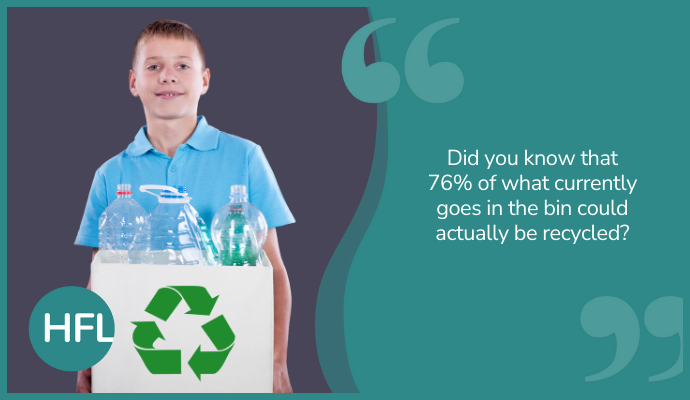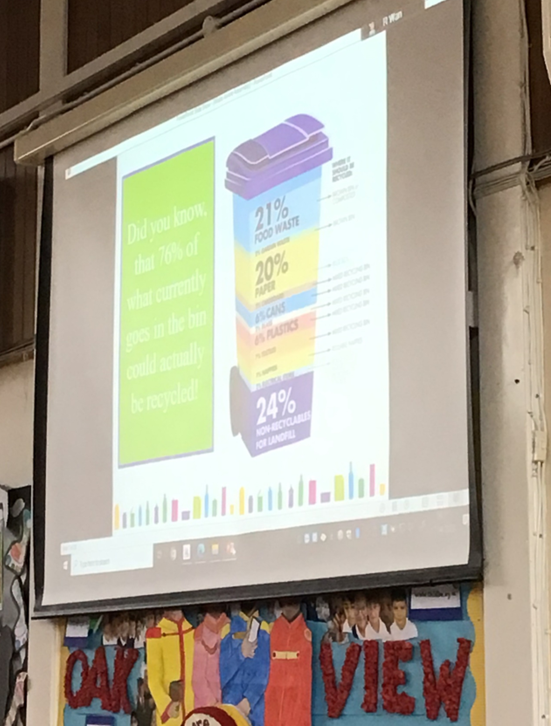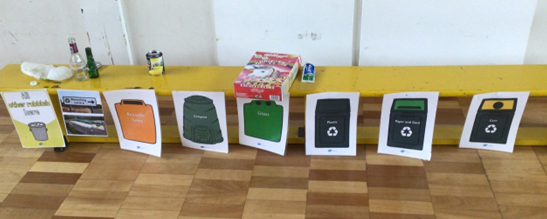
At the beginning of the Summer Term, Oak View welcomed Monika Koziara from HCC for a waste education visit. We began the morning with an assembly for Years 3 and 4. The children were engaged from the outset and were able to answer many of Monika’s questions using their own experiences and understanding. Monika’s questions were incredibly insightful and pulled out not only what the children already knew but also some misconceptions they had regarding waste management.
For example, one of the children mentioned incinerators after looking at a picture prompt in the presentation and stated that they believed that’s where the rubbish went to be burnt and that burning caused pollution to be released into the air. Monika’s follow up to this surprised many of the children (and even some of the adults)! She explained that although the burning of our waste releases various ‘naughties’, as technology improves, incinerators are more and more capable of dealing with the release of these chemicals by trapping them and stopping them before they go into the air. In fact, what we see being released into the air isn’t smoke but steam which can be used to generate electricity.
Another shock to the children was that the UK wouldn’t be creating any more landfills because we are running out of space and it isn’t sustainable. Even more shocking was that meant all our rubbish would have to be taken out of Hertfordshire (because we don’t have any incinerators in Hertfordshire yet).
We then discussed climate change and the release of methane adding to this. The children were very knowledgeable and understood some of the larger impacts climate change is having on our world. This linked in very nicely with the workshop sections – ‘So what can WE do about it?’

The children staying for this section had a chance to reflect on this during a movement break before their practical activity.
We chose Year 4 to take part in the practical activity this year as it links very nicely with their Science unit: ‘Animals and their habitats’. Particularly the curriculum objective: ‘recognise that environments can change and that this can sometimes pose dangers to living things.’
Monika linked this incredibly well in terms of the land needed for incinerators and landfills, but also the harm that rubbish can cause to our wildlife.
The children were then able to discuss the different materials that daily items were made of and did a sorting activity to see what we would do if we wanted to rid ourselves of particular items. The children not only enjoyed the ‘hands on’ approach of this activity but thought hard about what they would do with each item. The following were their key takeaways from this session:

- pringles cans can’t be recycled (apart from the lid) because they are made of too many different materials
- when in doubt, throw it out (black bin) otherwise entire lorries of waste may not be able to be recycled
- old worn-out clothing that isn’t fit for donating can be recycled at recycling centres
- paper can only be recycled a set number of times as it begins to lose its integrity – egg cartons are usually the last form paper takes on
Needless to say, the session was incredibly informative, and the children (and adults) gained a lot from it.
We also wanted to include our ‘Teacher Top Tips’ for planning your session:
- each Hertfordshire school is entitled to one free visit per school year
- book ahead – the visits get booked up a few months in advance – so look ahead at when this visit would be best and reach out to book.
- Monika will pitch the presentation at whichever level suits your children – let her know in advance which year groups will be at the assembly and which will take place in the workshop
- the videos played use YouTube – so worth asking for them in advance to download or ensuring you will be able to use YouTube on the day
- a hall space is really helpful to allow the children to move freely during the workshop
- a couple of follow up resources completed in class following the presentation helped the children to think more critically about what they had learned
- this workshop can link well to the Science topics of ‘Animals and their habitats’, ‘Materials and properties’ and ‘Changes of materials’ across the primary year groups. It links nicely to Forest school activities and the Eco-schools Green Flag accreditation as well. More information on Eco-Schools can be found here.
Bookings for visit can be made through Monika Koziara at Monika.Koziara@hertfordshire.gov.uk and more information regarding recycling for schools in Herfordshire can be found at the Eco Schools website:
Eco Schools: What is Eco Schools
Sarah Taylor (Year 4 Teacher Oak View Primary and Nursery) and Siobhan Stuart (HFL Primary Science Adviser)
Voices from the Classroom
Our new blog series, Voices from the Classroom, allows primary science teachers to share particularly effective practical experiences they have had with their classes. It’s a great way to showcase what your school is doing and written guidance and examples are available for those of you wishing to participate.
If this is something you would be interested in participating in, please email Charlotte Jackson charlotte.jackson@hfleducation.org


